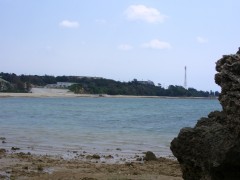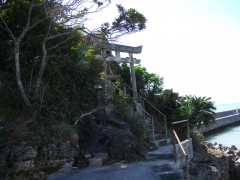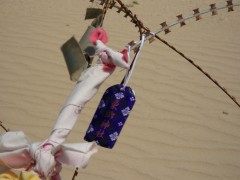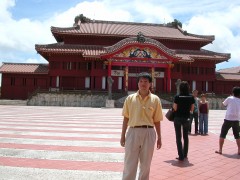04 May 2010
Film"Avatar" is like what's happening in Okinawa
James Cameron's world's biggest box hit film after "Titanic". An ex-US Marine man arrived on a planet and joined the native people by getting his brain signals into artificial figure of that native man. His mission was to blend in their community and negotiate with them in order to dig natural resources from their land.
Well, I did not really enjoy it because the story was cliche and animation scenes were not impressive maybe because I did not see 3D version. I watched it on DVD. After an hour, I just skipped chapters. I would rather like to see a full animated version of the film than mixture of real and animation.
The bottom line is that is the America's apology and remource to native Americans, Iraqi, Afghans, and global environmental destruction. But to me it is really hypocritical after years of deception and wrong doings. Isn't that what they talked about 30 years ago after Vietnam war?
Anyway, if they think they have been doing wrong, why not they rethink current destruction of great nature in Okinawa Prefecture, Japan?
It is taking place in the Henoko Sea right next to US marines' Camp Shwab. It was designated as the relocation site for Futenma base in Ginowan city on the same island. The coral sea is just beautiful. To me, it is better than Guam, Hawaii, Cancoon, and Kota Kinabalu.
Endangered marine mammal, dugongs habitat were recognized.
But construction of runway has been planned on that sea for the US marines by Japanese tax payers' money.
Is it for Japan's defense? No. US military deployed in Japan never functioned as Japan's defense. US marines use Japanese facilities for their training and missions. Well, this issue is very complicated. As you learn more about this issue, you can find Japan side has more to blame. In summary Japanese government can let most of US military leave Japan once they decide to do because there is no merit for Japan by the US military presence and the US military has no more strategic interest in Japan since the Cold War era ended.
However, if the US declares to withdraw troops from Japan without any relocation within Japan, this problem can be easily solved.
On May 4 2010, Japan's prime minister Hatoyama Yukio visited Okinawa governor and mayor of Nago city where Camp Shwab is located. Last month he said "destroying the sea by reclaiming is blaspheming the nature" but later he announced the plan to construct runway by QIP (placing sticks on the sea ground to support runway) format. He is crazy. It is just as destructive to the environment as reclaiming.
The Henoko has shrine on the coast. That god made him say that, I believe.
Or the charm I left in the wire on the beach. The wire divides the beach from restricted area. The charm is what I bought at the Admiral Togo Shrine in Tokyo.
However this construction plan will never be done because Okinawans and even the U.S. military oppose this newly fixed plan. Last September Japan experienced the change of governing party, then the relocation plan got on the review. After months of turmoil left distrust to the Japanese government and the U.S..
But I think this is great progress for Japanese to raise awareness that the U.S. military is nothing but trash and Japan has to defend its country all by themselves. Defending such beautiful sea like the below video from invaders.
But interesting history exists in Okinawa. Okinawa used to be an independent kingdom like Hawaii and Guam. But late 19th century Japanese government took over and annexed to the Empire of Japan. After the world war 2, the U.S. military grounded the island and had occupied until 1972. That is why tens of bases are located in Okinawa. The below photo is recreation of palace of what was called the Ryukyu Kingdom. This place is Okinawa's most famous tourist spot, called Shurijo.
16:47 Posted in Ecology, Japan News, Politics, Travel, US-Japan relationship, USA issues | Permalink | Comments (1) | Tags: okinawa, military
14 February 2010
TOYOTA deserves Recalls and Bashing!
Toyota is Japan's biggest corporation, not only that, it is the world's largest auto company.
But I do not like Toyota, not because recent recall scandals but its arrogance as giant corporation.
The scandal spread from the U.S. to Japan.
A few years ago, Mr. Okuda, a former president and counselor of Toyota made a very arrogant comment in relation to media's bashing of Ministry of Health and Labor. Because Mr. Okuda had a friend in the ministry, he said "Current media's bashing of the ministry is too much, I think we should withdraw sponsorship from them."
What a pity is no media tried not to respond to his comment. Good media should have responded like "Oh, good, then we can reveal anything about Toyota's problem such as heavy overwork on engineers that resulted in death, exploiting dispatched workers for cheaper cost that resulted in masscre in Akihabara shopping district committed by a Toyota factory worker, making public streets warehouse for "Just In Time" policy and etc.
There are too many hidden facts never reported by media because of too strong sponsorhip.
Since his comment, I decided not to buy Toyota cars regardless its quality and brand status. Now such brand status and quality is deteriorated by recent scandals.
For the U.S. auto makers, it is a great opportunity to take over Toyota's share that has been taken. Great time for the revenge?
Well, GM bankrupt itself, not by Toyota.
In my opinion, it is time Toyota and other Japanese auto makers stay away from U.S. market.
The U.S. market is huge but by the world's key currency, US dollar. They do not produce goods by themselves but by Chinese printing US dollar bills to give them.
The world has been supporting the U.S. because it has been thought the largest and most powerful, attractive market in the world.
Kind of weird situation, isn't it.
I think it still is, but you never know the future of it.
The bottom line is safest market is at home. We do not have to seek cheap and high quality goods any more but safe domestic goods.
17:17 Posted in Japan News, Media, Society, US-Japan relationship | Permalink | Comments (0) | Tags: toyota
24 January 2010
US military base Relocation Plan was rejected by local citizens
A candidate who opposes US military's relacation of Futenama Marine base in Okinawa to Henoko located on the same island won the mayor election of Nago city which includes Henoko area. Former mayors all agreed the relocation plan. The below photo is Henoko beach. The relocation plan is to landfill beautiful beach and ocean that endangers dugongs and other wild life. More than 30 of new species were found by WWF Japan in this area. Even U.S. environmetalist groups oppose the plan by suing their government. S.F. Federal Court ordered the military to review the plan.
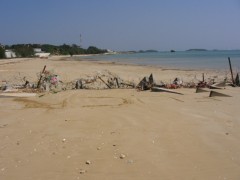
This relocation plan has been controversial since new ruling party took power in September. New ruling party, Democratic Party of Japan announced alternative plan but it has yet reached agreement with the U.S.
This mayor election result proved to be Henoko plan is no longer feasible.
So where would Futenma be relocated to? Well, that is their business, not ours. To Guam where local citizens have no right to choose American President or mainland or reduce the marines.
The U.S. military is useless in this country. It was important during the Cold War era because its presence functioned as deterrent to Soviet Union and we could get financial aid from the U.S. and export Japanese goods to the U.S. market in exchange for providing bases to the U.S. which countered communism.
Now Soviet Union fell down, the Cold War ended. Not just Futenma, Kadena, Yokosuka, Yokota, Atsugi, Zama, Misawa, Iwakuni, Sasebo, all should be gone. We can protect our country ourselves, in fact we have to anyway.
The below photo is sign near the beach that says "Beach is our treasure. Take garbage (and base) to your home. Environment and Sanitation Department of Nago City." (and base) is handwritten.
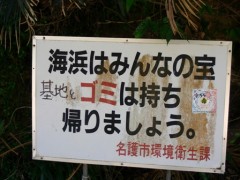
U.S. military, GO HOME where you belong!!
23:48 Posted in Japan News, Politics, US-Japan relationship, USA issues | Permalink | Comments (1) | Tags: military
09 January 2010
An Alliance Larger Than One Issue
Read this New York Times Article written by Joseph Nye, an prominent expert of US-Japan relationship.
An Alliance Larger Than One Issue
SEEN from Tokyo, America’s relationship with Japan faces a crisis. The immediate problem is deadlock over a plan to move an American military base on the island of Okinawa. It sounds simple, but this is an issue with a long back story that could create a serious rift with one of our most crucial allies.
--Ommited paragraphs from the original article.--
Even if Mr. Hatoyama eventually gives in on the base plan, we need a more patient and strategic approach to Japan. We are allowing a second-order issue to threaten our long-term strategy for East Asia. Futenma, it is worth noting, is not the only matter that the new government has raised. It also speaks of wanting a more equal alliance and better relations with China, and of creating an East Asian community — though it is far from clear what any of this means.
When I helped to develop the Pentagon’s East Asian Strategy Report in 1995, we started with the reality that there were three major powers in the region — the United States, Japan and China — and that maintaining our alliance with Japan would shape the environment into which China was emerging. We wanted to integrate China into the international system by, say, inviting it to join the World Trade Organization, but we needed to hedge against the danger that a future and stronger China might turn aggressive.
After a year and a half of extensive negotiations, the United States and Japan agreed that our alliance, rather than representing a cold war relic, was the basis for stability and prosperity in the region. President Bill Clinton and Prime Minister Ryutaro Hashimoto affirmed that in their 1996 Tokyo declaration. This strategy of “integrate, but hedge” continued to guide American foreign policy through the years of the Bush administration.
This year is the 50th anniversary of the United States-Japan security treaty. The two countries will miss a major opportunity if they let the base controversy lead to bitter feelings or the further reduction of American forces in Japan. The best guarantee of security in a region where China remains a long-term challenge and a nuclear North Korea poses a clear threat remains the presence of American troops, which Japan helps to maintain with generous host nation support.
Sometimes Japanese officials quietly welcome “gaiatsu,” or foreign pressure, to help resolve their own bureaucratic deadlocks. But that is not the case here: if the United States undercuts the new Japanese government and creates resentment among the Japanese public, then a victory on Futenma could prove Pyrrhic.
The photo of planned relocation site for Futenma, the construction plan threatens lives of endangered marine mammals, dugongs and a lot of other wildlives.
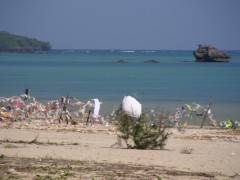
14:40 Posted in Japan News, Politics, US-Japan relationship | Permalink | Comments (0) | Tags: military, okinawa






